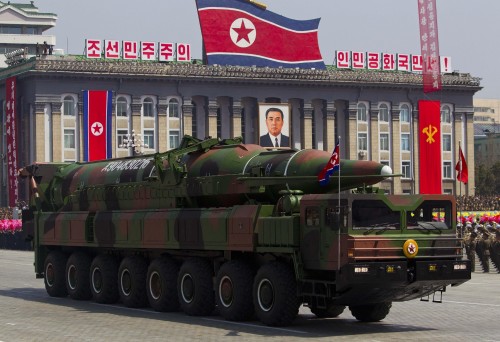North Korea: Navigating the “Land of Lousy Options”
North Korea rang in the New Year quite literally with a bang. On January 6th, a 5.1 magnitude man-made earthquake was detected in North Korea. Kim Jong Un’s regime was quick to claim responsibility for the quake, stating it was the result of a successful hydrogen bomb test. Scientists from the United States have cast doubt on North Korea’s claims of a hydrogen bomb test. The resulting earthquake seems to be too small to have been the byproduct of a hydrogen bomb test. Nothing has been verified as of yet because the detonation occurred deep underground, making it difficult to identify any resulting radiation. Even if this test turns out to in fact be a bluff, how long will it be before North Korea does achieve a successful hydrogen bomb test?
Suspicion of possible nuclear activities in North Korea date back to the 1990s, despite the country being a signee of the nuclear Non-Proliferation Treaty (NPT). North Korea expelled inspectors from its nuclear facilities and formally withdrew from the NPT in 2003. The Six-Party Talks took place from 2003 to 2007, during which North Korea conducted its first nuclear test in. North Korea conducted subsequent nuclear tests in 2009, 2013, and now in 2016. Throughout the nuclear tests, North Korea has improved the range of its missiles over time. Its new missile capabilities have brought the United States into its range of potential targets. Fear has arisen over concerns of North Korea’s potential to equip a nuclear weapon to a missile.
Reviewing North Korea’s nuclear history reveals there has been little to no success in halting the country’s progress in its nuclear program. However, another detail that has not been addressed is hidden in the history: North Korea is unreliable and cannot be trusted. Every single deal that has been reached in the past has been broken by North Korea. With this in mind, North Korea’s demands for recognition as a nuclear power and its promises to not use nuclear weapons recklessly or its ending programs in exchange for the United States and South Korea halting joint military exercises must be met with suspicion. This raises the question, how do you negotiate or make a deal with an actor you cannot trust?
There have been discussions on pressuring China to take a harsher stance on North Korea. China is North Korea’s most important ally and its biggest trading partner. Suggested actions include cutting shipments of oil and food, or restricting access to banks. What many people and even politicians forget is that the North Korean issue is in fact multidimensional. The aspect that is too often omitted from policy and news headlines is the ongoing humanitarian crisis. If Chinese trade and food aid is cut or halted, the North Korean people will certainly be the ones to suffer, not the regime. A United Nations inquiry has found that North Korea has committed appalling human rights abuses against its own people on a scale unparalleled in modern society. These actions have been compared to that of the German Nazis. Free thought and beliefs are basically nonexistent in North Korea. The regime has several prison camps where rule breakers and political prisoners are sent. The prisoners in these camps are subjected to torture, starvation, and even execution.
The challenge in the end is trying to grapple with both security and human rights issues at the same time without impeding progress on either issue. Esteemed Asia expert, Victor Cha stated that policy regarding North Korea is the “land of lousy options,” with options ranging from bad to worse. Even if a deal can be reached that could be successful in regards to the nuclear and human rights issues, the problem of North Korea’s inconsistent dependability continues to pose another roadblock to reaching a solution.
Ironically, North Korea itself may have presented an interesting policy option that could be combined with another policy to be viable on both fronts. The regime has expressed interest in opening up the country’s economy. While there is danger in the regime gaining more funds to dedicate to its nuclear and missile programs, an open economy North Korea could make significant progress on the human rights front. Even now, officials have been more tolerant of activities in the local markets and have even allowed farmers to keep and sell more of their produce. An open North Korean economy could allow for even more leniency and possibly give the people some freedom. To deal with the nuclear security issue, the United States and the international community must maintain tenacious deterrence. The world must show North Korea that it will respond with overwhelming force to any violent actions. While allowing North Korea to open its economy and continued deterrence are by no means perfect policy options, they will allow the international system to develop better and more effective policies.
—
Kevin Princic is a first year graduate student at the School of Diplomacy and International Relations at Seton Hall University. He is a graduate of the University of Mount Union where he studied Japanese and International Relations. At Seton Hall he is specializing in Global Negotiation and Conflict Management and Foreign Policy Analysis. His region of interest is East Asia. He is an Associate Editor for the Journal of Diplomacy and International Relations.
Follow Kevin on Twitter: @K_Princic
Follow the Journal on Twitter: @JournalofDiplo
Image Source: Center for Security Policy


Kevin,
Uncle Kurt here. Great job. I am really proud of you.
Keep up the fantastic effort.
KP